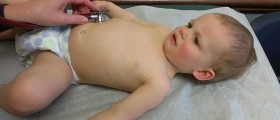
Kennel Cough
Kennel cough (canine infectious tracheobronchitis) is an upper respiratory problem in the dogs. This infectious disease is characterized by harsh, hacking cough where the affected dog frequently coughs. Kennel cough is a common disease in dogs and usually it resolves on its own after one to two weeks.
Causes of Kennel Cough
A dog becomes infected when inhales certain types of bacteria or virus. Kennel cough can be caused by different factors. They include parainfluenza virus, Bordetella bronchiseptica and mycoplasma. Parainfluenza virus is associated with mild symptoms and the dog usually recovers within 6 days.
Bordetella bronchiseptica is bacteria that most commonly cause kennel cough. Symptoms last for about 10 days but even after that period, affected dog is still contagious for 6 to 14 weeks.
Most commonly, parainfluenza virus and Bordetella bronchiseptica appear together in infected dogs.
Symptoms of Kennel CoughCouple of weeks after the exposure to virus or bacteria, infected dog will present symptoms. Sound of cough can be similar to clearing throat. Dog may start coughing whenever it undergoes physical strain. Cough can be dry and with mucous discharge. If mucus is white in color, your dog probably has mild form of kennel cough. However, if mucus is green these can be sign of severe case of kennel cough, which requires immediate veterinarian help. In severe cases, the symptoms may include: fever, lethargy, lack of appetite and pneumonia. In very severe cases, kennel cough can be fatal.
Diagnosis
Diagnosis is usually based on the symptoms, physical exam, bacterial cultures, viral isolation and blood tests. An X-ray may be needed if a veterinarian wants to rule out pneumonia or distemper.
Treatment of Kennel Cough
Common mild form of kennel cough is usually treated with antibiotics, such as azitromycin. Affected animal can be treated with bronchodilators and cough suppressants as well.
Before introducing antibiotics, you may give your infected puppy Pediatric Robitussin four times per day. Also, you may relieve your pet’s cough by giving it vaporizing treatment three times a day. Take off the collar to prevent stimulation of cough.
Homeopathic treatment can be helpful for kennel cough. Plantago lancelota is homeopathic substance that can help your dog to cough up the mucus and it prevents production of mucus too. Bryonia C6 helps to clear mucus from the system and soothes irritated mucus membranes.
Prevention
Kennel cough can be prevented by vaccination. However, kennel cough vaccines are not 100% effective. The best prevention is not to expose to other dogs, especially if you suspect they are infected. But if you regularly take your pet to dog shows for example, then the vaccine is recommended.
Additionally, you can boost the dog’s immune system with the help of various homeopathic remedies.














-Arthritis_f_280x120.jpg)


Your thoughts on this
Loading...